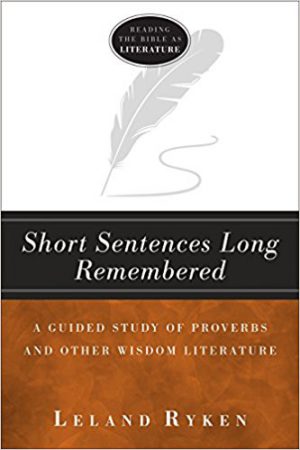Leland Ryken, Short Sentences Long Remembered: A Guided Study of Proverbs and Other Wisdom Literature (Wooster, OH: Weaver, 2016).
For the past six months, I have read one chapter of Proverbs every day as part of my daily quiet time. Proverbs is delightful, instructive, and challenging, not to mention occasionally repetitious and boring. Sometimes, it also seems to make promises that real life doesn’t bear out. “The Lord does not let the righteous go hungry, but he thwarts the craving of the wicked” (Proverbs 10:30). In my experience, that’s not always true (even if it is often true or eschatologically certain).
Leland Ryken’s Short Sentences Long Remembered describes itself as “a guided study of Proverbs and other wisdom literature.” Ryken is professor of English emeritus at Wheaton College—my alma mater, and I took classes on English literature and John Milton from him. His focus is on the proverb as a literary genre.
The proverb genre is found most prominently in Proverbs (the book), but it is also present in the Bible’s other books of “wisdom literature,” (e.g., Ecclesiastes, James, etc.). Its core is a simple, epigrammatic sentence. In poetry, the proverb most often appears as a two-line unit, with the second line paralleling the first in some way. Over time, the poetic forms of the proverb become longer and more complex. In prose, the proverb is part of a paragraph that spins out “a series of individual thoughts related to it.”
Short Sentences Long Remembered can be read profitably by an individual or a group. It includes interpretive exercises in each chapter, titled “Learning by Doing.” Most of the examples are drawn from Proverbs, Ecclesiastes, and James.
The book does not deal with the theological tension in wisdom literature between the promise of divine blessing for righteousness (Proverbs) and the experience of suffering by the righteous (Job). Indeed, Job doesn’t factor into the book at all. So, if you’re looking for a theological introduction to Proverbs, this is not the book for you.
If you’re trying to understand the proverb literarily, however, this is a good book to start with. I do wish, though, that Ryken had included a “For Further Reading” section in the book, so people could move from his introduction of the topic to more advanced works on the subject.
____
P.S. If you found my review helpful, please vote “Yes” on my Amazon review page.

